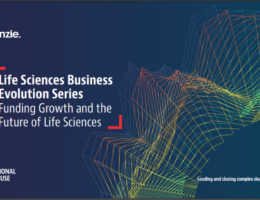The requirement that an inventor provides an enabling disclosure of their invention in exchange for patent protection lies at the heart of the patent system and is a central consideration for organizations across innovative sectors, especially those in life sciences and pharmaceuticals. This webinar delves into the dynamic landscape of patent enablement and plausibility standards, comparing and contrasting the nuanced approaches adopted in the US and Europe. In this session, we will discuss these recent developments, with a special focus on what they mean with respect to licensing, M&A and other transactions in the healthcare space and how you can anticipate issues as they arise in deals.
2023 is gearing up to be an interesting year for those in the life sciences sector, with upcoming reforms to the established regulatory and IP landscapes that will impact innovator strategies in R&D, commercialization, and patent enforcement. While reforms are currently under draft by the European Commission, the key areas of anticipated change are highlighted in a newly published article in The Life Sciences Lawyer.
On 4 January 2022, the new UK foreign investment review regime under the National Security and Investment Act 2021 came into force. The new rules require businesses and investors to submit mandatory notifications for certain acquisitions of, and investments in, companies active in 17 key sectors of the economy. They also grant the Government extensive powers to investigate and impose conditions on a wide range of transactions (including both corporate investments and asset transactions) on national security grounds.
How do life sciences companies intend to leverage new and existing sources of growth? Explore the trajectory of life sciences transactions in our latest report.
As digital transformation reshapes business models with different emphases across regions, digitally enabled strategies are helping companies transition from product-only offerings to product-service hybrids, orient to patient mapping, pre-diagnostics solutions and enhancing treatment administration.
As COVID-19 rapidly spreads to every corner of the globe and is officially declared a pandemic, governments across the world are adopting emergency measures to fight against this extraordinary situation. Ultimately, all these measures are aimed at protecting the health and wellbeing of citizens. However, on the healthcare and life sciences front in particular, such measures range from intervention powers to guarantee adequate supplies of treatment and medical equipment, to the relaxation of deadlines and regulatory requirements to simplify administrative procedures wherever possible, so that competent authorities, manufacturers and other actors can focus on urgent priorities related to the COVID-19 crisis.
The Baker McKenzie Healthcare & Life Science Industry Group presented the first of a series of short webinars sharing legal industry insights and providing practical guidance in the context of today’s evolving world. On 17-18 November 2020, the session focused on a region-by-region view of the evolving compulsory licensing regimes during the COVID-19 pandemic.
As COVID-19 rapidly spreads to every corner of the globe and is officially declared a pandemic, governments across the world are adopting emergency measures to fight against this extraordinary situation. Ultimately, all these measures are aimed at protecting the health and wellbeing of citizens. However, on the healthcare and life sciences front in particular, such measures range from intervention powers to guarantee adequate supplies of treatment and medical equipment, to the relaxation of deadlines and regulatory requirements to simplify administrative procedures wherever possible, so that competent authorities, manufacturers and other actors can focus on urgent priorities related to the COVID-19 crisis.
As COVID-19 rapidly spreads to every corner of the globe and is officially declared a pandemic, governments across the world are adopting emergency measures to fight against this extraordinary situation. Ultimately, all these measures are aimed at protecting the health and wellbeing of citizens. However, on the healthcare and life sciences front in particular, such measures range from intervention powers to guarantee adequate supplies of treatment and medical equipment, to the relaxation of deadlines and regulatory requirements to simplify administrative procedures wherever possible, so that competent authorities, manufacturers and other actors can focus on urgent priorities related to the COVID-19 crisis.
With the healthcare and life sciences sector at the heart of the pandemic, we are seeing some new issues arising in the already complex world of life sciences collaborations, for both coronavirus-related and other products and therapies. The Life Sciences Collaborations: Key Considerations in the COVID-19 Era document is a…









